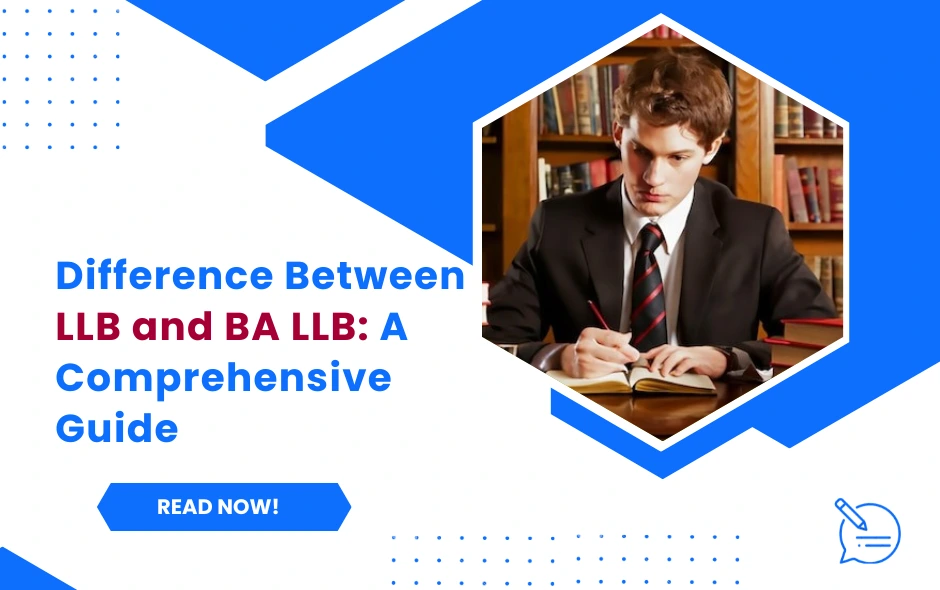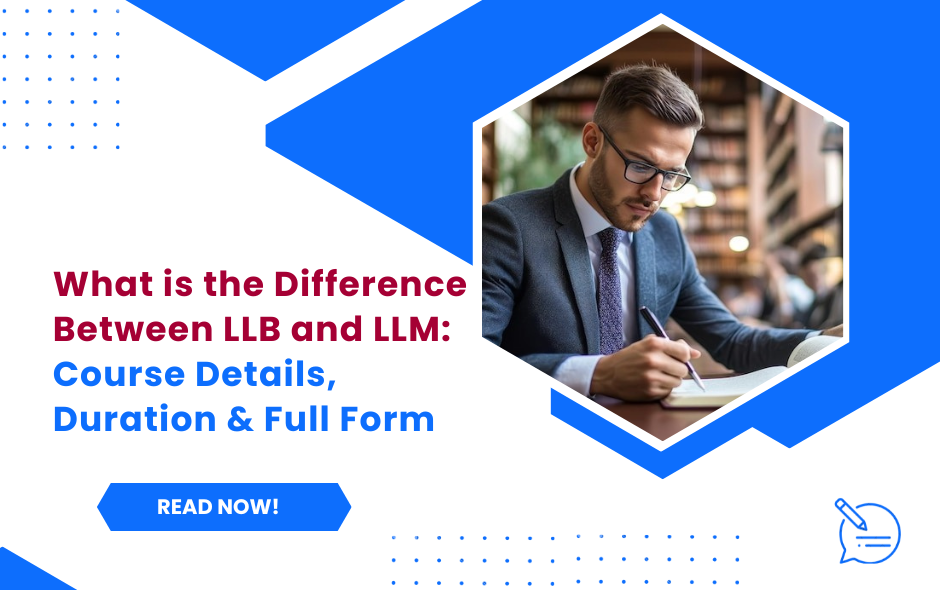Law Courses After 12th: Exploring Your Path to a Legal Career
Choosing the right path after completing school is a big decision, and if you're interested in justice, rights, and laws, then law courses after 12th could be the perfect choice for you. These courses not only help you understand how laws work but also open up various career options in the legal field. Whether you dream of becoming a lawyer, judge, or legal advisor, pursuing a legal course after 12th can set you on the right track for a rewarding and impactful career. Let’s explore the different law courses available and what they offer!
Types of Law Courses After 12th
Students who have completed their 12th grade and wish to pursue a career in law have several options. The most popular choice is enrolling in five-year integrated law programs that blend legal education with other disciplines. Additionally, students can explore diploma and certificate courses in law for a more focused study on specific legal areas. Here are the key types of law courses after 12th:
- Five-Year Integrated Law Degrees
- Diploma Courses in Law
- Certificate Courses in Law
Types of Five-Year Integrated Law Courses After 12th
If you're interested in a career in law after 12th, several five-year integrated law courses combine legal studies with other fields like arts, commerce, science, business, or technology. These courses provide a balanced education, allowing you to gain knowledge in both areas. Here are some of the most common options:
B.A. LL.B. (Bachelor of Arts + Bachelor of Laws)
- What it is: This course combines a Bachelor of Arts with law studies. You’ll learn about political science, sociology, and history alongside legal principles.
- Who it's for: It's perfect for students interested in understanding law in a broader social and cultural context. For example, this is a good option if you want to see how politics or society impacts the law.
|
Course Name |
B.A. LL.B. (Bachelor of Arts + Bachelor of Laws) |
|
Eligibility |
10+2 (any stream) with at least 45-50% marks (may vary by institution) |
|
Course Duration |
5 years |
|
Examination Type |
Semester-based |
|
Course Fees (INR) |
INR 2,00,000 – ?6,00,000 (varies by institution) |
|
Average Salary (INR) |
INR 3,00,000 – ?8,00,000 per annum |
|
Job Positions |
Advocate, Legal Advisor, Corporate Lawyer, Public Prosecutor, Legal Analyst |
|
Entrance Exams |
CLAT, AILET, LSAT India, SLAT, MH CET Law |
|
Top Recruiters |
Law firms (Amarchand & Mangaldas, Khaitan & Co.), Corporate firms (Tata Group, Reliance), Legal Process Outsourcing (LPO) companies, Public Sector Undertakings (PSUs), Banks |
B.Com. LL.B. (Bachelor of Commerce + Bachelor of Laws)
- What it is: This program merges commerce (business, accounting, and finance) with law. Students will study economics taxation law, and gain a comprehensive legal education.
- Who it's for: This course is excellent for students interested in pursuing careers in corporate law, tax law, or business advisory roles. It's a perfect choice among the law courses after 12th, providing a solid foundation for understanding business and legal principles.
|
Details |
B.Com. LL.B. |
|
Course Name |
B.Com. LL.B. (Bachelor of Commerce + Bachelor of Laws) |
|
Eligibility |
10+2 from a recognised board with a minimum of 45-50% marks (varies by college) |
|
Course Duration |
5 years |
|
Examination Type |
Semester-based |
|
Course Fees (INR) |
INR 1,00,000 – ?10,00,000 (varies by institution) |
|
Average Salary |
INR 3,00,000 – ?8,00,000 per annum (depending on experience and location) |
|
Job Positions |
Corporate Lawyer, Legal Advisor, Compliance Officer, Tax Consultant, Advocate |
|
Entrance Exams |
CLAT, AILET, LSAT, SLAT, MH CET Law |
|
Top Recruiters |
Corporate Law Firms, MNCs, Banks, Legal Departments, Law Consultancies |
B.Sc. LL.B. (Bachelor of Science + Bachelor of Laws)
- What it is: This course combines science subjects (like biology, chemistry, or physics) with law. You’ll learn how science and technology intersect with the legal world.
- Who it's for: It is ideal for students with a science background who want to focus on environmental law, medical law, or technology-related legal fields.
|
Course Name |
B.Sc. LL.B. (Bachelor of Science + Bachelor of Laws) |
|
Eligibility |
10+2 or equivalent from a recognised board with a minimum of 45% to 50% marks (may vary by institute) |
|
Course Duration |
5 years (Integrated program) |
|
Examination Type |
Semester-based system |
|
Course Fees (INR) |
INR 2,00,000 - ?10,00,000 (varies by college or university) |
|
Average Salary |
INR 3,00,000 - ?7,00,000 per annum (depends on job role and experience) |
|
Job Positions |
Legal Advisor, Lawyer, Corporate Lawyer, Legal Consultant, Advocate, Legal Analyst |
|
Entrance Exams |
CLAT (Common Law Admission Test), LSAT India, AILET, SLAT, and various university-specific entrance exams |
|
Top Recruiters |
Law Firms (Amarchand & Mangaldas, AZB & Partners, Khaitan & Co.), Corporate Houses, Legal Departments of Banks, Government Agencies, NGOs |
B.B.A. LL.B. (Bachelor of Business Administration + Bachelor of Laws)
- What it is: This program integrates business administration with legal studies, teaching how business operations connect with legal frameworks.
- Who it's for: If you’re interested in working in corporate law, business consultancy, or as a business legal advisor, this course offers a great start.
|
Course Details |
B.B.A. LL.B. (Bachelor of Business Administration + Bachelor of Laws) |
|
Course Name |
B.B.A. LL.B. (Bachelor of Business Administration + Bachelor of Laws) |
|
Eligibility |
10+2 or equivalent with a minimum of 45-50% marks from a recognised board |
|
Course Duration |
5 Years |
|
Examination Type |
Semester-based examinations |
|
Course Fees (in INR) |
INR 2,00,000 - ?7,00,000 (varies by college) |
|
Average Salary |
INR 3,00,000 - ?8,00,000 per annum (depending on experience and company) |
|
Job Positions |
Corporate Lawyer, Legal Advisor, Business Consultant, Legal Analyst, Law Officer |
|
Entrance Exams |
CLAT, LSAT, AILET, SLAT, MHCET Law |
|
Top Recruiters |
Top Law Firms, Corporate Companies, Legal Departments, Banks, MNCs |
B.Tech. LL.B. (Bachelor of Technology + Bachelor of Laws)
- What it is: This is a unique combination of engineering (B.Tech.) with law. You will study technology-related topics alongside legal principles.
- Who it's for: It’s perfect for students who want to focus on fields like intellectual property law, cyber law, or other areas where technology and law intersect.
|
Detail |
Description |
|
Course Name |
B.Tech. LL.B. (Bachelor of Technology + Bachelor of Laws) |
|
Eligibility |
12th grade with Science (PCM) or equivalent; minimum percentage criteria vary by institution (typically 50-60%). |
|
Course Duration |
6 years (integrated course) |
|
Examination Type |
Semester-based exam assessments include theory and practicals. |
|
Course Fees (INR) |
INR 1,00,000 - ?2,50,000 per year (varies by college) |
|
Average Salary |
INR 4,00,000 - ?8,00,000 per annum (can vary based on skills and experience) |
|
Job Positions |
- Corporate Lawyer - Intellectual Property Lawyer - Legal Advisor - Compliance Officer - Cyber Law Consultant |
|
Entrance Exams |
- CLAT (Common Law Admission Test) - AILET (All India Law Entrance Test) - LSAT (Law School Admission Test) - University-specific entrance exams |
|
Top Recruiters |
- Law Firms (e.g., Amarchand & Mangaldas, Khaitan & Co.) - Corporates (e.g., Infosys, TCS) - Government Agencies - NGOs - Startups |
Diploma Law Courses After 12th
Diploma in Merger and Acquisition
What it is: This course focuses on the legal aspects of mergers and acquisitions between companies. You'll learn about the regulations, procedures, and strategies of combining businesses.
Who it's for: It is ideal for students interested in corporate law and business management, especially those who want to work in corporate finance or legal advisory roles.
Diploma in Air and Space Law
What it is: This course covers the legal principles governing air travel and space exploration. You’ll study international treaties, regulations, and safety standards related to aviation and space.
Who it's for: It's excellent for students passionate about aviation, aerospace technology, or international law and those looking to enter aviation law or space policy careers.
Diploma in Media and Law
What it is: This course explores the relationship between media and law, including issues like freedom of speech, censorship, and intellectual property rights in media.
Who it's for: Perfect for students interested in journalism, communications, or entertainment law, particularly those wanting to understand the legal challenges media professionals face.
Diploma in E-Learning, E-Litigation, and LPO (Legal Process Outsourcing)
What it is: This course focuses on the legal implications of online learning, litigation, and legal services outsourcing. You’ll learn about technology's role in law.
Who it's for: It is ideal for tech-savvy students who want to explore how law is applied in digital spaces or those interested in e-litigation or legal process outsourcing careers.
Diploma in Social Legislation
What it is: This course examines laws that address social issues such as welfare, education, and health. You'll study legislation to improve social conditions, making it a vital part of law courses after 12th.
Who it's for: This course suits students passionate about social justice who want to work in NGOs, social services, or government agencies focused on social policy.
Diploma in Anti-Corruption Laws
What it is: This course focuses on laws and regulations to prevent corruption in public and private sectors. You’ll learn about enforcement mechanisms and anti-corruption policies.
Who it's for: Great for students interested in public policy and governance or working with organizations focused on transparency and accountability.
Diploma in Foreign Investment Laws
What it is: This course covers legal frameworks governing foreign investments in different countries. You’ll learn about regulations, compliance, and investment treaties.
Who it's for: It is ideal for international business or trade law students or those looking to work in financial institutions or law firms that deal with foreign investments.
Diploma in Alternative Dispute Resolution Systems
What it is: This course explores methods of resolving disputes outside traditional court systems, such as mediation and arbitration. You’ll learn about negotiation techniques and conflict resolution.
Who it's for: It is perfect for students pursuing careers in conflict management or mediation or those interested in legal practice without litigation.
Diploma in Intellectual Property Laws
What it is: This course focuses on laws protecting intellectual property rights, including patents, trademarks, and copyrights. You’ll learn how to safeguard creative works.
Who it's for: It is ideal for students interested in technology, innovation, or the creative industries, particularly those who want to work in IP law or corporate legal departments.
Diploma in Corporate Laws
What it is: This course covers the laws and regulations governing companies and corporations. You’ll learn about corporate governance, compliance, and legal issues in business operations.
Who it's for: Suitable for students looking to work in corporate law firms, businesses, or regulatory bodies focusing on corporate affairs.
Diploma in Cyber Laws
What it is: This course focuses on the legal aspects of the Internet and digital technologies. You’ll study issues like data protection, privacy, and cybercrime laws.
Who it's for: It's excellent for tech-savvy students interested in the intersection of law and technology, especially those who want to specialize in cyber law or data privacy.
Diploma in Taxation Laws
What it is: This course covers laws related to taxation, including income tax, corporate tax, and international taxation. You’ll learn about tax compliance and the legal implications of taxation.
Who it's for: It is ideal for students pursuing careers in tax consultancy, accounting, or government taxation departments.
Diploma in Labour Laws
What it is: This course focuses on employment laws, workers’ rights, and workplace safety. You’ll learn about labour regulations and the legal framework protecting employees. It falls under the umbrella of law courses after 12th, providing a foundational understanding of legal principles relevant to the workplace.
Who it's for: This course is ideal for students interested in human resource management and labour relations or those looking to work in government labour departments or NGOs. It equips you with the necessary skills and knowledge to navigate the complexities of employment law effectively.
Diploma in Human Rights
What it is: This course examines the global laws and principles that protect human rights. You’ll learn about human rights laws, advocacy, and international treaties.
Who it's for: It's perfect for students passionate about social justice and humanitarian work or those looking to work in NGOs, international organizations, or government agencies focused on human rights.
Choosing law courses after 12th can open up many career opportunities for students. Whether you’re interested in becoming a lawyer, working in human resources, or joining a government agency, these courses provide essential knowledge about legal systems and workers' rights. CGC Jhanjeri offers excellent programs that can help you gain the skills needed for a successful career in law. You can positively impact your community and beyond with a solid foundation in legal studies. Consider exploring your options and taking the first step towards a rewarding legal career!
Frequently Asked Questions
1. Which course is best for law after 12th?
Ans: The best course for law after 12th is typically the BA LLB (Bachelor of Arts and Bachelor of Laws) or the B.Com LLB (Bachelor of Commerce and Bachelor of Laws). These integrated courses combine law with other subjects, providing a well-rounded education. If you're interested in a traditional route, you can pursue a 3-year LLB after completing a bachelor’s degree in any field.
2. Can I do a 3-year LLB after 12?
Ans: No, you cannot directly pursue a 3-year LLB after 12th grade. You need first to complete a bachelor's degree in any subject. After that, you can apply for the 3-year LLB program designed for graduates.
3. Which law is best to study?
Ans: The best law to study depends on your interests. Some popular areas include Corporate Law, Criminal Law, Intellectual Property Law, and Human Rights Law. Choosing a field you are passionate about and aligns with your career goals is good.
4. Which is better, LLB or BA LLB?
Ans: It depends on what you want. If you are clear about your interest in law and want to start your legal education right after school, BA LLB is an excellent choice as it combines arts subjects with law in a 5-year program. If you already have a bachelor's degree in another field, then a 3-year LLB is the way to go. Both paths lead to becoming a lawyer, so consider your educational background and career goals.



















